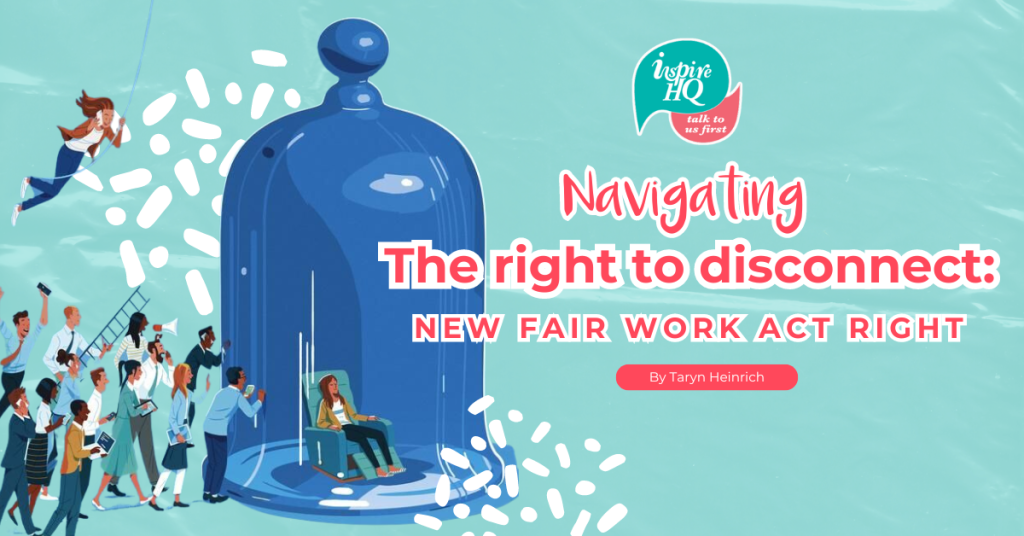With the constant accessibility provided by smartphones and laptops, many employees find themselves tied to their jobs long after they’ve left the office. Both physically and mentally. Recently the Fair Work Act has introduced a new workplace right aimed at granting employees the freedom to ‘disconnect’ from work obligations outside of their designated work hours.
By legally protecting the right to disconnect, employees gain the assurance that they won’t be penalised for prioritising their mental health and personal lives over work engagement. This change empowers employees to switch off from work-related communication and demands during non-working hours. It also sends a message about the evolving nature of work culture. Organisations must continue to support environments that prioritise employee wellbeing and recognise the value of downtime.
Under the Fair Work Act, the Right to Disconnect refers to the right of employees to disconnect from work-related communications and activities outside of their designated working hours. It acknowledges that employees have the right to rest and leisure time without the expectation of being constantly available for work-related matters.
From 26 August 2024 for medium and large business employers, and 26 August 2025 for small business employers (less than 15 employees) the “Right to Disconnect” will be a workplace right under general protection laws. These laws are protected rights all employees receive under the Fair Work Act.
The right to disconnect generally allows eligible employees to:
- refuse to monitor, read or respond to contact, or attempted contact, from an employer outside of the employee’s working hours unless the refusal is unreasonable;
- refuse to monitor, read or respond to contact, or attempted contact, from a third party if the contact or attempted contact relates to their work and is outside of the employee’s working hours unless the refusal is unreasonable;
The Fair Work Act provides a non-exhaustive list of matters that the Fair Work Commission must consider when it determines whether a refusal is unreasonable. These include the following:
- the reason for the contact or attempted contact
- how the contact or attempted contact is made and the level of disruption the contact or attempted contact causes the employee
- whether the employee is compensated (including non-monetary compensation) for;
- being available in the period when contact is made or attempted; or
- working additional hours outside their ordinary hours of work
- the nature of the employee’s role and the employee’s level of responsibility
- the employee’s personal circumstances, including family or caring responsibilities
By 26 August 2024, all awards must incorporate a ‘right to disconnect’ provision. This means that specific rules will be added to awards to explain how this new right will apply to different industries and occupations. Employers will need to stay informed about the implications of these changes in accordance with the terms and conditions outlined in their respective awards.
Undoubtedly, adapting to the management of the Right to Disconnect poses a significant challenge. Finding a balance that respects employees rights, whilst maintaining productivity will be essential. Implementing effective strategies and policies to navigate this requires careful consideration.
Below are some recommendations for effectively navigating this new framework.
- Develop comprehensive policies outlining the expectations and limitations regarding after-hours communication. This includes defining what constitutes work related communication, the appropriate channels for communication and the circumstances under which employees are expected to respond
- Ensure that employees understand their rights and obligations under the Right to Disconnect policy
- Encourage managers and team leaders to lead by example by respecting boundaries and refraining from sending non-urgent messages outside of work hours
- Offer training sessions for manager to ensure they refrain from taking any adverse action against employees who choose to exercise their right to disconnect
- Explore the use of technology that can assist in managing after-hours communication, such as scheduling email delivery for the next working day
- Encourage a culture where employees feel empowered to disconnect without fear of repercussions
- Emphasise the importance of work life balance, and encourage employees to prioritise their well-being outside of work. This could include access to Employee Assistance Programs for employees who may experience difficulties balancing work and personal responsibilities
- Regularly review the effectiveness of the Right to Disconnect policy and gather feedback from employees to identify any areas for improvement
As we continue to navigate the intricacies of the modern work landscape, the introduction of the right to disconnect serves as a reminder of the importance of fostering flexible workplaces where employees can thrive both professionally and personally.
If you would like assistance in developing a Right to Disconnect policy, setting up an Employee Assistance Program or any other policy documentation, or for more information on how we can assist you, visit our website www.inspirehq.com.au or give us a call on 5331 1734 to set up your free Inspire HQ People Hour.


